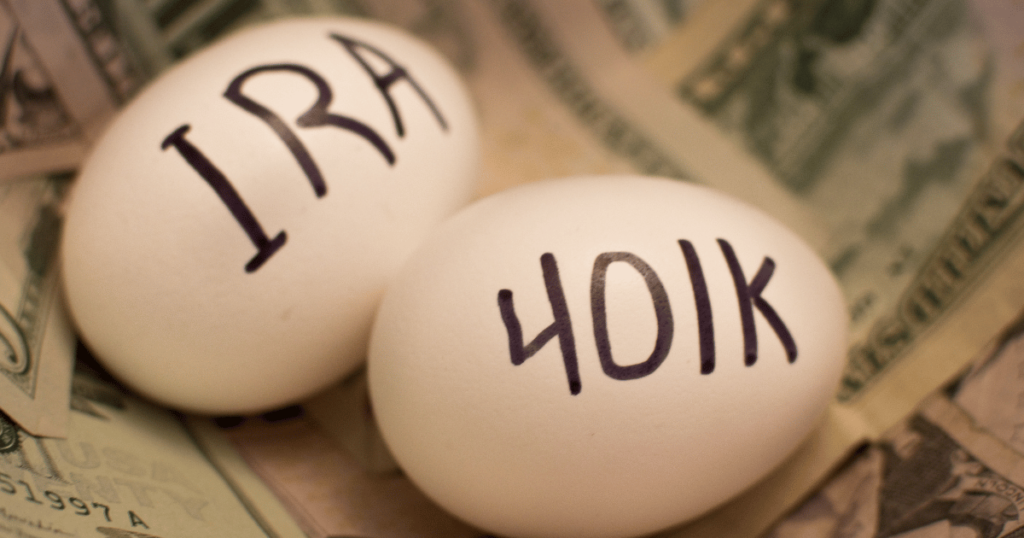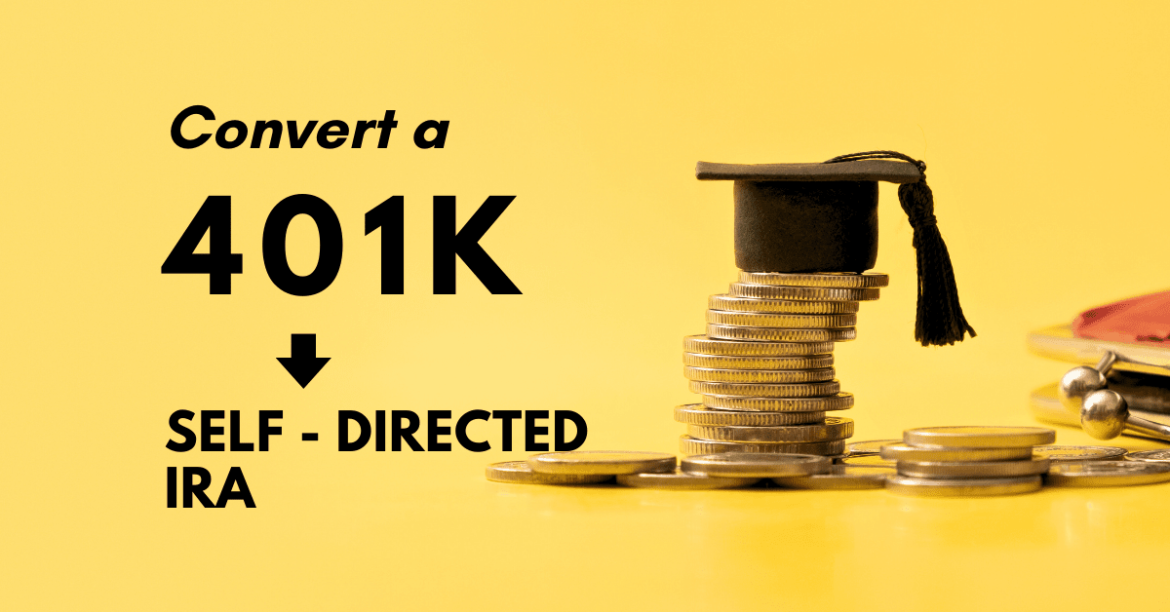Article Contents
This is one of the best financial strategy plans seniors must know, especially if you are planning to retire (or not)!
Retirement planning can be complex, but there is one financial strategy that seniors have to consider- converting their 401k to a self-directed IRA. This strategy ensures you grow your wealth while repeating tax benefits and setting yourself and your family up for a blissful retirement!
In this article, we shall explore what a 401k and self-directed IRA are, the benefits of this rollover strategy for seniors, how to make the conversion and other financial plans for retirement savings.
What is a 401k
A 401k ( (employer-sponsored retirement savings plan) is a category of retirement savings plan that is given by employers to their employees. It allows employees to set aside a share of their pre-tax income to save for retirement. The contributions made to a 401k are taxed once the money is withdrawn. The money in a 401k account is usually invested in multiple options, such as mutual funds, stocks, and bonds. The purpose of a 401k is that the account grows over time.
Example: Let’s say Jenny earns $50,000 per year and contributes 5% of her salary to her 401k. That comes down to $2,500 annually. If Jenny’s employer offers a 50% match, it means they will contribute an additional $1,250. So, her total contribution for the year would be $3,750.
What is a self-directed IRA?
A self-directed IRA (Individual Retirement Account) is a retirement savings account that gives individuals more control over their investment choices. With a self-directed IRA, seniors can tailor their investments based on financial targets and preferences. It is best practice that they follow IRS rules to sustain the tax advantages and eligibility for retirement savings.
Benefits: Let’s put it, unlike a 401k, when you place your money in an IRA, you must pay tax. But:
- No tax when withdrawing money from an IRA.
- No paying tax on profit during an investment.
Example: Let’s say you buy a real estate property with your IRA money and sell it for a considerable profit. Guess what; you don’t have to pay a single penny tax!
The 401K to self-directed IRA strategy for seniors
There are many financial schemes and strategies to follow when it comes to growing your wealth and securing a golden future for retirement. Here is why the 401K to self-directed IRA strategy will empower seniors to take control of their retirement savings.
1. Expanded investment options
Unlike a traditional 401K, a self-directed IRA opens the doorway to numerous investment opportunities. Seniors can expand their portfolios by investing in stocks, bonds, mutual funds, real estate, precious metals, and even private businesses.
2. Greater control and independence
Seniors have the control to make investment decisions (based on informed choices) on their own terms. They are not limited by the investment options chosen by an employer or a financial establishment. This autonomy allows seniors to pursue investments that align with their interests, values, and expertise.
3. Prospective higher returns
By diversifying their investments, seniors can achieve higher returns and grow their retirement savings. 401K to self-directed IRA strategy gives seniors lucrative options with better returns compared to traditional investment modules.
4. Tailored retirement income stream
Self-directed IRAs offer the flexibility to streamline retirement income in a way that suits individual needs, one of which is the tax benefits. Self-directed IRAs provide tax-deferred or tax-free growth, allowing seniors to maximize their savings and potentially reduce tax liabilities.
5. Long-term wealth
It is never about riches but building wealth. The self-directed IRA strategy allows seniors to build a diversified and resilient portfolio that can withstand market fluctuations. In addition, seniors can alleviate risk and preserve wealth over the long term by investing in diverse asset classes.

How can seniors convert 401k to self-directed IRA?
Whether you are in assisted living facilities or nursing homes, having secured financial savings during retirement can stretch the golden years an extra mile. So if you’re pondering about how to convert 401k to self-directed IRA, let us zoom in on the path you need to follow to keep your retirement golden.
1. Understand IRS rules and regulations
Familiarize yourself with the IRS guidelines regarding 401k rollovers to self-directed IRAs. Look for guides or resource notes on the matter. Also, it is wise to be informed about any possible tax implications and contribution restrictions.
2. Research and select an IRA custodian
Try to acquire a reliable IRA custodian who concentrates on self-directed IRAs. They will guide you through the adaptation process and ensure compliance with IRS rules.
3. Set up a self-directed IRA account
You can create a self-directed IRA account with your selected custodian. Then, complete the required paperwork, and provide the essential identification to open the self-directed IRA account.
4. Contact your employer
After finding an IRA custodian, notify your employer that you intend to rollover your 401k funds into a self-directed IRA. They will provide the necessary paperwork and direct you through the administrative steps.
5. Complete the rollover paperwork
Fill out the necessary paperwork provided by your employer and the IRA custodian. This usually includes the rollover request form and ‘how-to transfer’ instructions.
6. Choose between direct rollover or indirect rollover
You can choose between a direct rollover or an indirect rollover. With a direct rollover, funds are moved directly from your 401k to the self-directed IRA custodian. An indirect rollover involves getting a distribution from your 401k and then depositing it into the self-directed IRA within 60 days (to avoid taxes and penalties).
7. Investment options
Seniors can invest in various options once the funds are in their self-directed IRA. It can be stocks, bonds, mutual funds, or even real estate. But, conducting thorough research (maybe even getting help from a financial professional) will help to make an educated investment decision.
8. Monitor and manage your investments.
Make sure to regularly review your self-directed IRA investments and make alterations as needed. In addition, stay updated with market trends and pursue professional advice when required.
Any other financial plans for retirement savings?
While 401k rollover to a self-directed IRA is a great way to solidify your finances, putting only some of your eggs in a basket is a wise choice. Seniors should consider other financial plans when it comes to retirement savings. Here are some solid ideas to get you going!
Precious metals investment
Precious metals, like gold, have and continue to withstand the tests of time. Historically, gold has been a popular choice in times of economic crisis and makes for a great investment portfolio. Other precious metals like platinum, palladium, and even silver not only diversify your portfolio, but these metals have industrial value and can act as a hedge against inflation.
Real estate investment
Real estate is always a wise investment. REITs (real estate investment trusts) and real estate crowdfunding platforms can offer investors (seniors) a chance to invest in real estate. This means not owning or managing properties directly. Instead, real estate investment will create a steady income and possible long-term appreciation (in value and income).
Annuities
Seniors should seriously consider annuities. Annuities or FSA (Flexible Savings Accounts) provide a definite income stream during retirement. There are various types of annuities, including fixed, variable, and indexed annuities. Each comes with its singular features and benefits. One of the sweetest benefits is the tax advantage. The money you keep grows without tax (until you withdraw).
Stocks and bond
A diversified portfolio consisting of bonds and stock is a significant investment based on calculated risk tolerance and financial goals. Seniors edging towards retirement will find stocks and bonds a substantial and safe investment (depending on the economy) because it offers a balanced investment strategy.
Health Savings Accounts (HSAs)
Unlike FSAs, HSAs or Health Savings Accounts offer a more flexible and long-term savings option seniors can use after their retirement. Once older adults reach the age of 65 and become enrolled in Medicare, they are generally not eligible for an HSA (Health Savings Account).
To qualify for an HSA, individuals need to have high-deductible insurance. The benefit of an HSA is that individuals can contribute pre-tax money and use it for qualified medical expenses only! However, it’s important to note that not all medical costs are covered by HSA funds.
Always contact a financial advisor or professional to evaluate your unique financial situation and investment opportunity! So to learn more, check out the following articles!
Final thoughts
Exploring different financial strategies for retirement savings can help seniors build a robust and diversified portfolio and, most importantly, secure their financial future. Thus, a rollover of 401k to a self-directed IRA will give seniors much greater control over investment options for their retirement savings!
So, the next time when you ask yourself, ‘Can I convert my 401k to a self-directed IRA, ‘ think of this piece and the steps and strategies we have laid out to ensure your retirement and financial journey stay eternally golden.
But if you want to enhance this knowledge, why not give these a read?
FAQs
How long does it take to convert a 401k to a self-directed IRA?
It depends on several factors. First, the timeframe to move 401k to a self-directed IRA can vary. It can depend on the proficiency of the involved institutions and the completion of essential paperwork. However, the process can generally take a few weeks to a few months.
How do I roll my 401k into a self-directed 401k?
You can convert a 401k to a self-directed IRA by transferring the funds from your 401k account to a self-directed IRA account. Again, a custodian help is involved who specializes in alternative investments.
Is a self-directed IRA better than a 401k?
Depending on the financial goals and preferences, a self-directed IRA offers better investment flexibility, including alternative investments. A 401k may have employer-matching similar contributions. Consider your circumstances and refer to a financial advisor for the best opportunity.
Can a self-employed 401k be rolled into an IRA?
Yes, you can transfer 401k to a self-directed IRA. A self-employed 401k, Solo 401k, or Individual 401k can be easily rolled into a traditional IRA. The process involves transferring the funds from the self-employed 401k to the IRA custodian.

